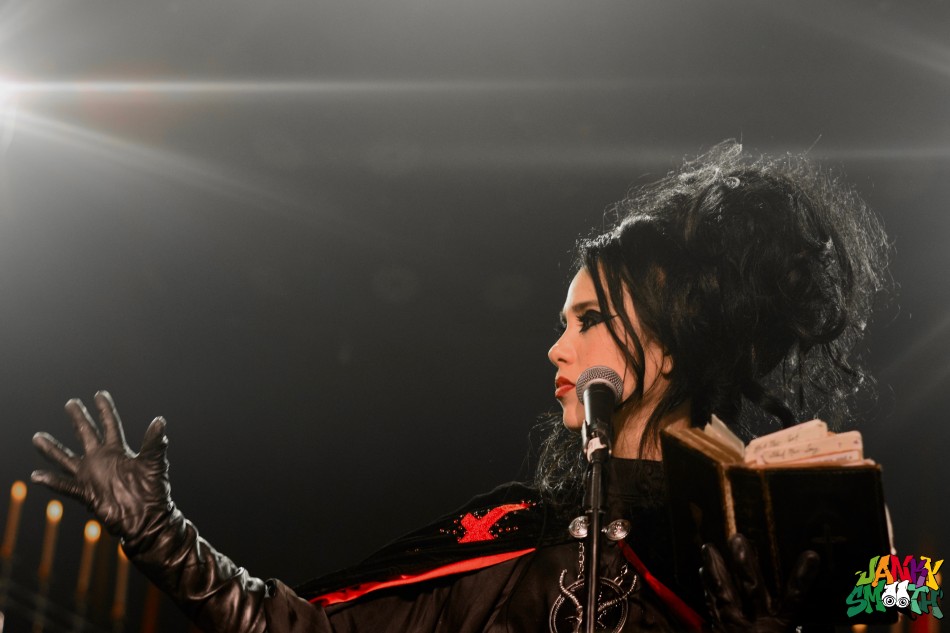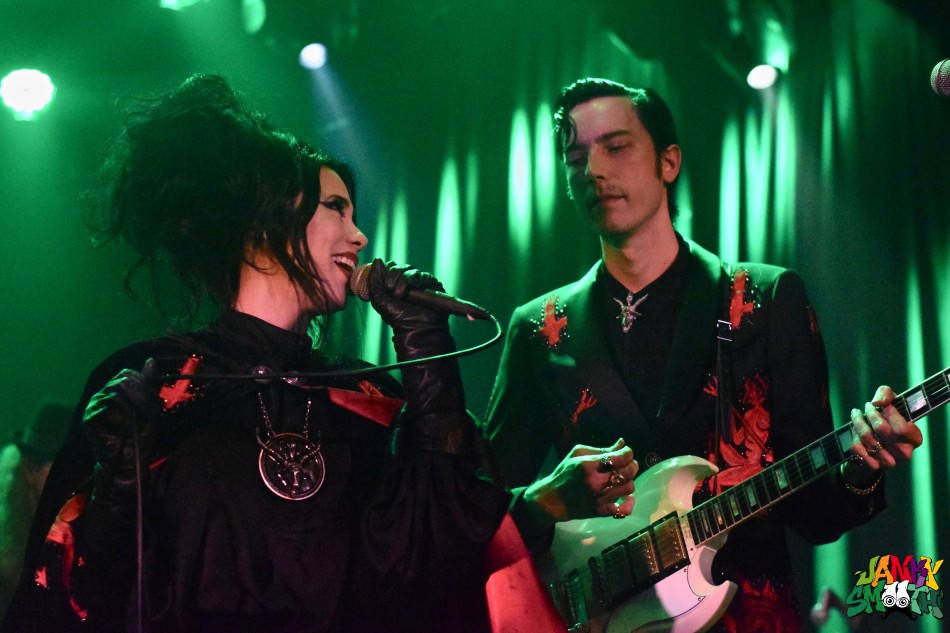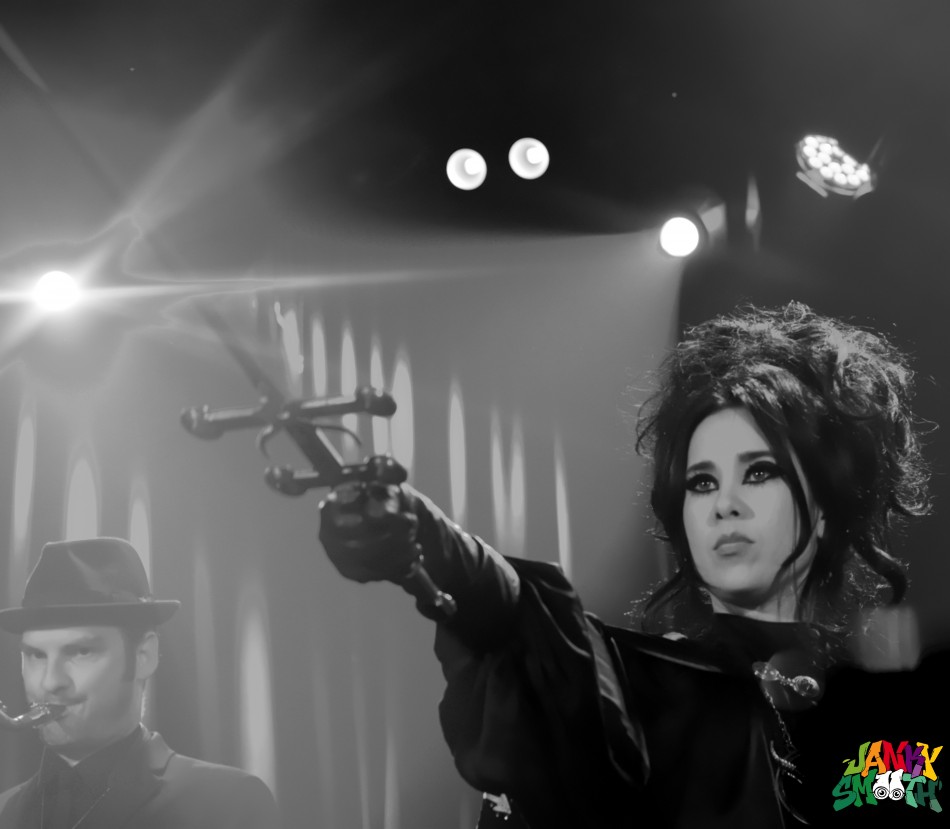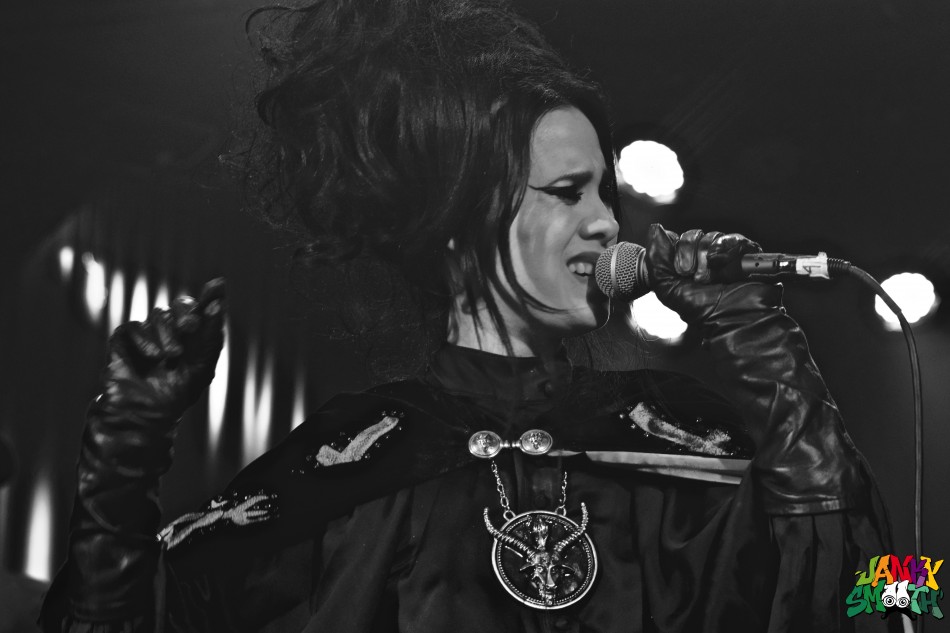
Twin Temple
“The greatest trick the devil ever pulled was convincing the world he didn’t exist.”
My opinion of Twin Temple is complicated. Before I clarify how, know despite the hilarious title, this is certainly not an endorsement of Christianity. I think worshipping a human being is just as whack as worshipping satan (or perhaps is slightly less) whether it’s for show or not.
Twin Temple, Alexandra and Zachary James, are a band with all the talent in the world that thought of a brilliant concept and materialized it into a package perfectly knit together with all its working parts contributing to something that is powerful and magnetic. Musically and theatrically, the members of this band were born to make and perform music. Removing the satanic component from their sound, they’re single handedly bringing back doo-wop with a sweet vengeance. Their latest banger “Satan’s a Woman” and a sold out Roxy performance are only two examples of how.
related content: Echo Part Rising (Five Pointed) Stars: Twin Temple

The rub lies in satanism, for me at least. I have so much to say about satanism and satan in music and how it relates to this band and cultural moment that I’m just going to get into all of it. Who’s satanism and what is satanism need to be answered before I continue. Lucifer was once God’s favorite angel and in an act that has made him an eternal symbol of rebellion, he rejected his servitude to God and fell from heaven to rule hell. There are many schools of satanism but originally, the values the religion espoused were things like “an eye for an eye” and “kindness only to those that deserve it” while it also shunned values like pity for the weak. There isn’t much room for empathy in traditional, old school satanism. Now though, as America finds itself in the midst of a culture war, we see a new kind of satanism arise as an opportunistic, convert hungry response to the status quo pushing back on certain groups that have always been oppressed by that status quo. It’s basically social justice satanism or intersectional satanism. Traditional satanists find this new breed of satanism problematic and if you ask a real satanist about how they feel about liberalism in general, you might not get the same answer as if you’d ask Twin Temple. Take Vital Remains singer and former High Priest in the Church of Satan, Brian Werner, who believes a satanic reformation similar to Martin Luther’s Protestant one is necessary.

I imagine I wasn’t alone in the sold out Roxy theatre, thinking everyone around me was crossing some spiritual boundary when they repeated chants of “Hail satan” and whatever other Rosemary’s Baby-like rituals the band was enacting. Still, I chose to enjoy the concert for it was. The music was good and it’s show business after all, right? The more I consider it, the less I think it matters whether it’s a show or not. For too many people, the show is life and in the era of social media, being a part of show business can mean posting an Instagram story. It’s not the same argument as violent video games making kids violent. Chanting Hail Satan in a large group and getting involved in rituals gives the content greater psychological power. It’s funny, in spite of nailing the point that Lucifer is their symbol of rebellion and individuality, much of the show went like this:
‘Think for yourself, reject servitude… now repeat after me…’
When I think of satanists, I think of people that make the mistake of trying to be more cool than real and so they wind up not being cool. It’s like the opposite of virtue signaling, only what they choose to signal is their subversiveness. To describe satanism, I would use the carefully chosen words “goofy” or “corny”. Satanism is goofy. Satanism is corny. Satanism is just as corny and goofy as BDSM. Don’t let the Los Angeles night crawlers fool you.
related content: Satanic Manic: Lethal Amounts Honors Anton LaVey On Halloween With ‘Disobey’ Gallery

I use the words corny and goofy for good reason. I watch a lot of hip hop media, the true musical art form of the oppressed groups that intersectionality and this form of satanism claim to represent. The heart of those groups, blacks, hispanics, middle-eastern people, people of color, think satanism is some bull shit. They call that shit corny/goofy. Like it or not, the core of the oppressed are still devoutly religious, so a coalition of every group left behind by the status quo might have a problem trying to band together under satanism. Like call out culture, this form of satanism is based on “white on white crime”.
One other interesting point related to hip hop is the theme of the illuminati pulling the strings of the music industry. Hip hop can be rather conspiratorial at times, lord knows their mistrust of government is justified, and so one of the things they often believe is that a cabal in the music industry works to engineer the population with imagery like satanism. I don’t know if you’d expect a satanic doo-wop band to do so well, so fast, with sold out Roxy shows and upcoming arena dates with Ghost under their belts at this early stage of their careers but maybe the success was organic… I surely think so.
As a huge metalhead, I never had a problem seeing satanic bands like Deicide or Behemoth. Death metal is less in your face and engaging with audiences in this regard though. In Twin Temple’s case, if you were to actually tell me that Lucifer had some wild plot to convert the world through doo-wop, I might consider it seeing as how much control the band had over their audience.
Death metal is a good place to start talking about satan’s connection to music throughout history because death metal bands often employ the tritone. The tritone, also known as the devil’s interval, has existed since medieval times and was said to summon the devil. In this video below you can hear Dave Mustaine play the tritone and like he says, it just sounds evil.
related content: The 1720th Circle of Hell: Deicide At 1720
From there, the devil’s next cameo came in the form of a deal with legendary blues guitarist Robert Johnson who was said to have sold his soul to be the best guitarist in the world. Once blues birthed rock and roll and Black Sabbath birthed metal, satan became a regular theme in music with Ronnie James Dio being credited for first using the “devil horns” hand salute at concerts. When Dio began using the hand gesture, he knew it as a symbol his Italian grandmother would use to ward off the evil eye.
Enter Twin Temple, the creators of satanic doo-wop. Doo-wop may seem like a departure from expectation as to where satanism belongs but I disagree. The band uses doo-wop as a vehicle to seduce Lucifer or to tell stories where Lucifer is the seducer. The band has songs playing both sides of the field with “Satan is a Woman’ but also “Lucifer, my Love”.
This sold out Roxy performance in question began with the OC Hurricanes, one of the most underrated bands I’ve ever seen, playing a wild set that had the keyboard player skateboarding on stage and diving into the crowd to play his keys. Every player absolutely ripped on their instruments and the singer could wail everything from love songs to unchained melodies to Doors homages. This band will put Southern California on the map again. The specific sound they create is the Los Angeles sound. People have seemed to forget that sound but the OC Hurricanes will remind everyone who So-Cal is.






After an intermission, the curtain lifted to reveal a stage decorated with candelabras and an altar bathed in crimson light. The band then took the stage, splashing the audiences with a liquid I could only imagine was unholy blood communion. After a short prayer, the band rolled right into music and stole the fucking show. I can’t deny their talent, it’s massive. I’m sure their music makes people fall in love and the duo’s actual romance only inspires more of that.
Alexandra voiced her support for the LBGTQA+ community; stood in solidarity with feminism and hexxing the patriarchy; and praised the individual over the collective. What I suppose she meant by that was not becoming part of the status quo. What I don’t think she realizes though, is that collectives are exactly what create change in society. LGBTQ, feminist, and black collectives fought for their rights and won. These points of conflict arise when you try to crossbreed two ideologies that don’t belong together, satanism and intersectionality are like oil and vinegar.
At the end of this article, I pose a question to you. Who is the greater rebel, Lucifer for refusing to serve God and sacrificing his position or Jesus for creating an opposing ideology from the status quo and resorting to self sacrifice to make his point? I say Jesus.



Words by: Rob Shepyer
Photos by: Audrey Kemp




